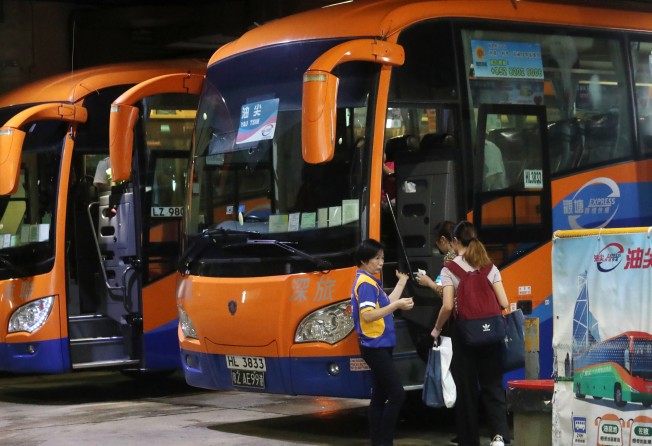Hong Kong cross-border bus firm expects 30 per cent decline in business to high-speed rail link
Coach operator pins hopes on mega bridge debuting later in year and affording new opportunities to reach western Guangdong province not served by express train network

A leading Hong Kong bus firm serving southern China is bracing for a 30 per cent dip in business after the high-speed rail link debuts, as most of its profit comes from short-haul trips.
However, the multibillion-dollar Hong Kong-Zhuhai-Macau bridge expected to open this year will give the coach operator and its competitors a lifeline by connecting the city to western Guangdong province, which is beyond the reach of the express rail project.
Eternal East Cross-Border Coach Management, the city’s leading cross-border bus company, said the HK$84.4 billion (US$10.7 billion) express rail link would pose a threat to its core services to Futian in Shenzhen and Panyu in Guangzhou.
“The high-speed rail will indeed have an adverse impact on our coach services for Futian and Guangzhou,” Eddie Choi, an assistant general manager for the operator, said. “We estimate that we may lose 30 per cent of our passengers to the express railway for these two destinations.”
At present, more than 1,000 coach trips carrying some 30,000 passengers are made daily from Hong Kong to Futian via the Huanggang border checkpoint. Eternal East provides more than 300 of these outbound trips at a rate of HK$37 (US$4.70) each.
A total of 100 outbound coaches go to Panyu every day, of which the bus firm runs 24 trips at between HK$80 and HK$100. In comparison, an express train journey costs about HK$78 to Futian and HK$247 to Guangzhou South.
The two short-haul destinations are among 44 direct-train destinations offered by the network. According to figures provided by the MTR Corporation, they will generate the main source of income for the cross-border rail link, especially Futian station, for which a journey from West Kowloon terminus in Hong Kong will only take about 14 minutes.
The train ride from West Kowloon to Guangzhou South will take between 47 minutes and 71 minutes, depending on the number of stops en route. Typically a cross-border coach takes about 40 minutes to get from Jordan in Kowloon to Futian and less than three hours to Guangzhou.
There will be about 58 return trains running daily between West Kowloon and Futian during peak periods such as public holidays, accounting for more than half of the 114 return trains for the six short-haul destinations. For service between West Kowloon and Guangzhou South, there will be 30 return trains daily.
The Futian station alone is expected to generate an average daily patronage of 38,700 for the high-speed rail this year, accounting for almost half of the total 80,100 patronage forecast for the entire Hong Kong service. Guangzhou South is second among mainland stations serving the city, with an estimated daily patronage of 16,000.
Choi estimated his firm could generate a daily patronage of about 16,000 for the two destinations.
Last year, 583,075 outbound coaches crossed the border from Hong Kong, or almost 1,600 coaches per day.
“About 60 per cent of our customers for these two destinations are Hongkongers who need regularly to cross the border daily,” Choi explained. “The remaining 40 per cent are individual mainland tourists.”
However, Choi said the firm would not consider cutting down on the number of coaches running the route. “We need to keep the frequency to provide convenience to passengers and maintain our quality of service. Instead, we will consider cooperating with nearby retailers to offer a promotional package combining fares with cheaper meals and goods.”
Even with cheaper rates, he admitted that long-haul destinations beyond Guangzhou would take longer than three hours per trip, saying those coaches would periodically encounter traffic jams and the travel time would make the routes less competitive than the high-speed rail.
But Choi remained hopeful the upcoming launch of the mega bridge would offer new and exclusive opportunities for cross-border bus firms to carve out a new market under the “Greater Bay Area”, a national scheme linking 11 southern Chinese cities into an integrated economic and business hub.
“The mega bridge will provide highway access linking Hong Kong via Zhuhai to western Guangdong province, which is now out of reach by the express rail,” he said. “We can explore new coach service to cities in the region such as Taishan, Zhongshan, Kaiping and Enping.”
“Risk-taking comes with great opportunities. We are hopeful that this bridge could create a new market for coaches that can offset our business losses.”
Lawmaker and former Kowloon-Canton Railway Corporation chairman Michael Tien Puk-sun agreed that coach services were the biggest rival to the express rail system. But he believed the firms needed to change their strategies to survive.
“The high-speed rail aims to garner about half of its total patronage from Futian station, for which its rail operator, MTR Corporation, could enjoy 95 per cent of its fare revenue, the biggest share among other stops in the revenue-sharing mechanism with its national counterpart, the China Railway Corporation,” he said.
Tien added that all the figures indicated the MTR Corp would focus on Futian station. Passengers who take MTR’s East Rail Line usually travel to the eastern part of Shenzhen via Lo Wu or to its western side via Lok Ma Chau.